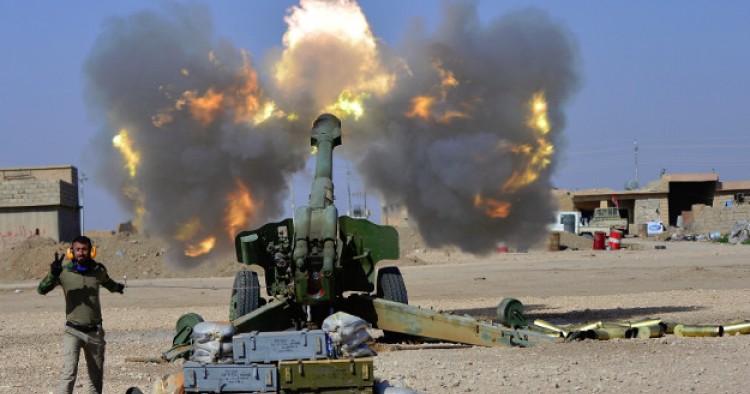Iraqi Kurdish Region President Masud Barzani has warned that the Hashd al-Shaabi – the paramilitary Iraqi forces also known as the Popular Mobilization Forces (P.M.F.) – is complicating the security and political situation in Mosul and broader Nineveh Province. According to Fars News Agency, which is affiliated with the Islamic Revolution Guards Corps (I.R.G.C.), the Kurdish leader made the remarks at a meeting with a high-level American delegation in Erbil, the capital of Iraqi Kurdistan. “Hashd al-Shaabi is present in Sinjar region without coordinating with any sides. And this has complicated the situation. Aggression by any forces near the Iraqi Kurdistan is unacceptable.” Gen. Joseph Votel, Centcom commander, Lt. Gen. Stephen Townsend, head of the U.S.-led coalition in Iraq and Syria, and Douglas Silliman, the U.S. ambassador to Iraq, were reportedly present at the meeting. The Centcom commander reportedly reiterated U.S. support to the Peshmerga forces and commended their battle against the Islamic State.
Comment: The P.M.F. – particularly units close to the I.R.G.C. – have scored significant territorial gains in western Nineveh Province. The paramilitary forces have seized strategic areas and land routes that connect Mosul to the Syrian border. But now that the Islamic State is on the verge of losing its last stronghold in the region, Iran-controlled P.M.F. groups have turned their attention to Iraqi rivals. In late March, a prominent Iran-backed Iraqi militia commander warned peshmerga forces loyal to the Kurdish Regional Government (K.R.G.) to withdraw from the northern Iraqi town of Sinjar and stressed that the P.M.F. will not allow any parts of Nineveh Province to be incorporated into the Iraqi Kurdistan Region. “Popular Mobilization Forces will spare no effort to confront the expansionist agenda of Masoud Barzani, the head of Iraqi Kurdistan Region, in Nineveh Province and other Iraqi areas,” Jawad al-Talibawi, a spokesman for the armed wing of Asaib Ahl al-Haq, said in an exclusive interview with Fars News Agency.
As Talibawi’s remarks indicate, the Sinjar region may prove to be a flashpoint for proxy conflicts once the Islamic State is defeated in Mosul and surrounding areas – particularly between factions supported by Iran and Turkey. Rival Kurdish groups – Iraqi Kurdistan Democratic Party (K.D.P.) and Kurdistan Workers’ Party (P.K.K.) – are already engaged in a deadly conflict in Sinjar. The PKK has conducted attacks inside Turkey for a long time, and Ankara has made it clear that it will not tolerate the presence of P.K.K. close to its border and will intervene militarily if needed. Such a move will most likely place Turkey and its Iraqi allies in a direct confrontation with Iran-supported militia groups that have considerable influence in western Mosul. The inter-Kurdish clashes in Sinjar may also sour relations between Iran and the K.R.G., which intends to bring Sinjar under its own authority.
The Middle East Institute (MEI) is an independent, non-partisan, non-for-profit, educational organization. It does not engage in advocacy and its scholars’ opinions are their own. MEI welcomes financial donations, but retains sole editorial control over its work and its publications reflect only the authors’ views. For a listing of MEI donors, please click here.












